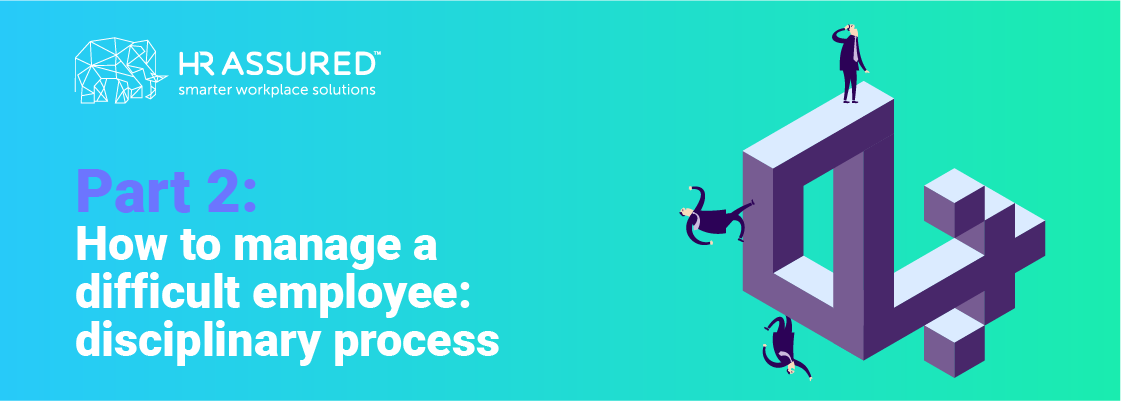By Annette Micallef and Bethany Silverman
We recently hosted and exclusive online event, where Senior Workplace Relations Consultant at HR Assured, Bethany Silverman share some valuable tips on how to manage a difficult worker. Some of the topics she covered included when you need to commence performance counselling, how to performance manage, and what happens if you get it wrong.
If you missed the event, we’ve written two articles jam-packed with useful information to help employers manage a difficult employee.
This article is the second in a two-part series, where we take a look at disciplinary processes and why businesses need to ensure they get this right from the start. Let’s begin…
1. What is a disciplinary process?
A disciplinary process is generally used where an employee has engaged in misconduct. Misconduct is categorised as behaviour that is sufficiently serious to cause damage to other employees or o the business and involves breaches of policies and procedures.
Disciplinary processes need to be acted upon quickly in order to address the concerns and reaffirm the employer’s expectations.
In many cases, a disciplinary process may require the employer to undertake an investigation or ‘fact finding’ process before any outcome is reached.
Lastly, for the majority of cases, the outcome will be a warning of some sort (which should always be reflected in writing) or, in some cases, if the conduct is particularly serious, termination.
2.What disciplinary process should I follow?
Where a conduct concern arises, the employer should determine:
- What is the nature of the conduct?
- Does it require the employer to undertake an investigation (e.g., suspected fraud, allegations of assault)?
- Inform the employee of the concerns and invite to a disciplinary meeting (at least 24 hours’ notice and opportunity to bring a support person).
- Conduct the meeting and consider the employee’s responses; and
- Decide on an outcome and follow up in writing.
3. What are the risks if I get the disciplinary process wrong?
What advice does Bethany’s give when having performance discussions or conducting disciplinary meeting? “While this can be confronting, challenging and even uncomfortable (especially when you are dealing with a difficult employee), it’s important for managers to know how to conduct the process and how to de-escalate an upset employee to avoid risks eventuating.
First up, let’s point out some tips to best disarm an upset employee.
Bethany says, “How you communicate to your employee during a one-on-one is vital. They will most likely be feeling upset, angry or emotional, so it’s a good idea to talk tentatively and use phrases like, ‘it’s my opinion that this may have happened’, or ‘I’m wondering if we could talk about this’ to shape the conversation.
“It’s also a good idea to avoid using absolutes such as ‘The fact if the matter is’, or ‘It shows you are not willing to consider other views’, these types of words could trigger or upset an employee even more.”
So, what are the risks?
- Unfair dismissal;
- General protections;
- Discrimination;
- Workers’ compensation; and
- Bullying & harassment claims.
4. Tips to getting the disciplinary process right
No one said this would be easy, but Bethany does have some excellent tips for managers and employers when going through the disciplinary process:
- Documentation is crucial;
- Evidence of the lawful, objective reasons for actions;
- Ensure you have an uncompromised decision maker;
- Update your contracts to exclude reciprocal application of policies and include express provisions around misconduct;
- Design and implement clear policies and procedures, particularly in relation to bullying, harassment, equal opportunity and the handling of workplace grievances;
- Seek advice before making any firm decisions; and
- Be measured – don’t rush!
We hope you found the information in this two-part series useful. If you have a question about managing a difficult employee, HR Assured clients can contact our 24/7 Telephone Advisory Service.
If you’re not an HR Assured client and need some advice, we’d love to support your business. Contact us today to arrange a free, confidential, no-obligation chat.
Annette Micallef is a Content Marketing Manager and works for FCB Group (HR Assured’s parent company). Annette is an incredibly passionate and enthusiastic marketing communications professional and she is responsible for creating interesting and meaningful content across FCB Group’s businesses. When Annette isn’t creating e-Books, email campaigns and blogs, you can find her in the great outdoors; she loves being surrounded by nature and considers this to be her happy place where she finds inspiration and ideas.
Bethany Silverman is a qualified Senior Workplace Relations Consultant at FCB Group and HR Assured. She regularly provides advice to a wide range of businesses in respect of compliance with workplace laws and managing complex matters including disciplinary and performance management processes and terminations.
Articles in this series:
Part 1: How to manage a difficult employee: performance management
Part 2: How to manage a difficult employee: disciplinary process




